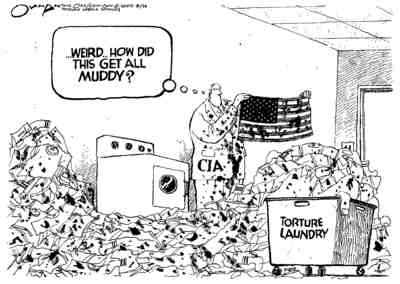- MENU
- HOME
- SEARCH
- WORLD
- MAIN
- AFRICA
- ASIA
- BALKANS
- EUROPE
- LATIN AMERICA
- MIDDLE EAST
- United Kingdom
- United States
- Argentina
- Australia
- Austria
- Benelux
- Brazil
- Canada
- China
- France
- Germany
- Greece
- Hungary
- India
- Indonesia
- Ireland
- Israel
- Italy
- Japan
- Korea
- Mexico
- New Zealand
- Pakistan
- Philippines
- Poland
- Russia
- South Africa
- Spain
- Taiwan
- Turkey
- USA
- BUSINESS
- WEALTH
- STOCKS
- TECH
- HEALTH
- LIFESTYLE
- ENTERTAINMENT
- SPORTS
- RSS
- iHaveNet.com
William Pfaff

Thus far in the CIA torture controversy, as in the torture debate that has gone on in
Never have I seen torture dealt with as intrinsically evil. Its national and international legality has been discussed. Concerned CIA officers have been quoted as saying that "10 years from now we're going to be sorry we're doing this . . . "; but they do it. In a 2004 report, which was released in part this week, the CIA's inspector general wrote, "One officer expressed concern that, one day, agency officers will wind up on some 'wanted list' to appear before the World Court for war crimes."
The question being asked then by top officials was does it work? CIA officers were asking themselves how much trouble will I be in if it doesn't work?; what will happen to my career if I don't get results? One superior officer is quoted as warning an agent that if the interrogation fails to produce dramatic results, and al-Qaida attacks the U.S. again, the agent would be held responsible.
The Bush administration said that of course the program worked. Ex-Vice President Richard Cheney ferociously defends the torture program to the present day as having produced high-value intelligence.
Nobody has offered any conclusive evidence that this is so. To do so, it is said, could reveal classified information.
The former vice president has also said that the interrogation program was run by "highly trained professionals who understand their obligations under the law."
On the contrary, according to the
Before the findings of the inspector general's report became known, one contract interrogator had been prosecuted for beating a man to death in
Since then, the IG report has made known illegal death threats to prisoners, staged deaths to intimidate prisoners, threats with firearms and electric drills, and threats to rape a family member in a prisoner's presence.
The officials involved in the torture program obviously have been concerned to know if there is a legal defense that would protect them if they should be indicted. That they were just following orders may be true, but has unpleasant historical connotations. A defense that possibly would be strong, although probably not impregnable, would have been a blanket presidential pardon to officials involved.
But that would have been taken as self-incriminating on the president's part, an admission that crimes might have been committed, whereas President Bush's presumed position is that nothing illegal could have been done under presidential orders, since a president's executive power in time of war is supreme -- a legal theory yet to be tested in the courts.
This is not an issue in which either Mr. Bush or his successor wish to find themselves in public dispute. Thus President Barack Obama's repeated insistence that the country should be "looking forward, not backward."
The CIA itself ordered the inspector general's report, and deserves credit for that; there were many officers who were disturbed by what the Agency was doing, and who anticipated what now could happen to discredit not only the Agency but the officials involved in what was done.
The IG report was ordered at a time when congressional concern about the situation was mounting, and the finished report was not published. The CIA decided that nothing reported in it warranted prosecution.
They certainly knew that if charges concerning torture were pursued up the chain of command, high figures in the previous administration could face charges that would constitute probably the gravest scandal in the nation's history -- and a terrible crisis in its domestic politics.
It is the Obama administration's new attorney general, Eric H. Holder Jr., who, when he took office, and read the CIA inspector general's report, decided that it must not be buried. He has appointed a prosecutor to investigate whether crimes were committed.
Let us therefore honor Eric H. Holder Jr. -- the only responsible official in two administrations to say that torture is evil, criminal, and in a nation governed by law must be prosecuted, if the national integrity is to be vindicated.
Available at Amazon.com:
One Nation Under Contract: The Outsourcing of American Power and the Future of Foreign Policy
Endgame: The Blueprint for Victory in the War on Terror